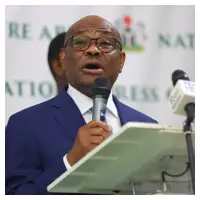The Minister of Works, David Umahi, has provided detailed explanations for the Federal Government's decision to implement tolling on Nigerian roads under President Bola Ahmed Tinubu's administration.
Speaking at the eighth edition of the 2025 Ministerial Press Briefing Session at the National Press Centre in Abuja, Umahi emphasized that road tolling is a strategic component of the government's infrastructure development plan aimed at ensuring sustainability and proper maintenance.
"Truly, the most important thing is not just building these roads. I've always said that in the past, we have built roads, but this is the only time that a President is constructing roads," Umahi stated, highlighting the administration's focus on quality and longevity of road infrastructure.
The minister pointed out that previous road projects across the country have failed to last up to 50 years, creating a cycle of deterioration and costly repairs. According to him, Nigeria currently has approximately 35 kilometers of roads nationwide, with plans to expand to over 38 kilometers with the addition of the new Legacy Project.
Public-Private Partnership Approach
Umahi explained that budgetary constraints make it difficult for the government to independently fund the completion and maintenance of all road projects, necessitating alternative financing models.
"That's why we are doing HDMI and of course, that is the PPP (Public-Private Partnership). The idea is not only to get these roads constructed but to also maintain them," he said.
The minister announced plans for stakeholder engagement sessions scheduled for the first week of June, where the government will appeal to citizens to support the tolling initiative once road projects are completed.
Alignment with Tinubu's Economic Vision
Umahi connected the road tolling strategy to President Tinubu's broader economic objectives, stating that the President aims to create a trillion-dollar economy while promoting local content.
"And I want to say that every worker in every ministry ought to keep to the same vision," the minister added, emphasizing the importance of alignment across government agencies.
The ministerial briefing was also attended by the Minister of Arts, Culture and the Creative Economy, Hannatu Musawa, and the Minister of Water Resources and Sanitation, Professor Joseph Utsev.
As the government prepares to implement this policy, Nigerians await more details on the toll rates, collection methods, and how the generated funds will be utilized to maintain the nation's road infrastructure.













